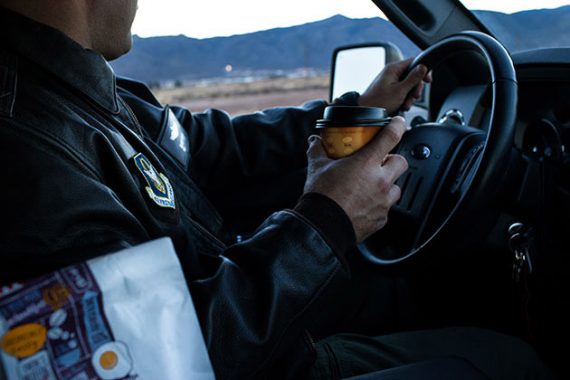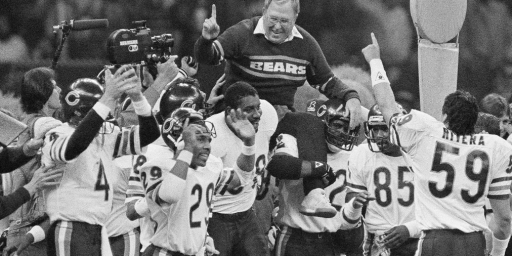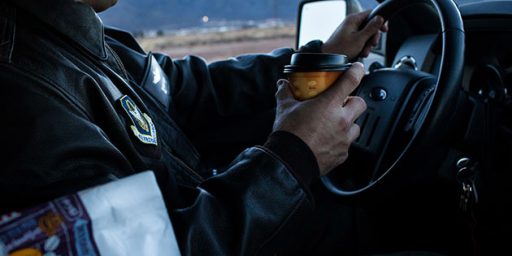Drone Pilots Are Bored
Going from flying a real airplane to operating a drone in Alamagordo sucks.
Going from flying a real airplane to operating a drone in Alamagordo sucks.
Mother Jones (“Drone Pilots: ‘Overpaid, Underworked, and Bored’“):
The preferred nomenclature inside the military for unmanned planes is RPA, for Remotely Piloted Aircraft. “Drone” conjures images of brainless bots on autopilot, an implication not appreciated by the three-person crew (pilot, sensor operator, intelligence analyst) typically tasked with operating the military’s high-tech workhorses.
The word drone also evokes monotony, which is what fills much of the pilots’ daily routines. Though strikes on suspected terrorists and the resulting civilian casualties get the headlines, the lion’s share of remote piloting consists of quieter, more shadowy work: hour after hour of ISR—intelligence, surveillance, and reconnaissance. Sitting in ergonomic chairs in ground control stations—essentially souped-up shipping containers—RPA operators coordinate with ground intel to identify human targets, then track them with high-powered zoom lenses and sophisticated sensors. (A nine-camera sensor nicknamed Gorgon Stare is capable of streaming full video with enough resolution to discern facial expressions.)
“It might be little things like a group of kids throwing rocks at goats, or at each other, or an old man startled by a barking dog,” says Mike. “You get a sense of daily life. I’ve been on the same shift for a month and you learn the patterns. Like, I’ll know at 5 a.m. this guy is gonna go outside and take a shit. I’ve seen a lot of dudes take shits.”
[…]
But an award or handshake can’t replace the buzz of flying at Mach speed over a combat zone. Many early recruits to the program flew jets, bombers, or cargo planes before being “asked” to transfer to drone duty under the impression they could reassign to a base of their choosing after putting in time on RPA rotations. But as demand for their new skill set increased, the timelines became moving targets. Some have been flying drones so long they would need expensive retraining to fly regular aircraft again.
“I’m overpaid, underworked, and bored,” says Ryan. “What the Air Force doesn’t get is that they can’t throw money at us to make us happy. I didn’t even know how much a pilot made when I enlisted. I just wanted to fly.” Brad, who flew a B1 bomber in Afghanistan and is now an RPA instructor at Holloman, compares it to “being transferred from marketing to the accounting department.” Ryan says pilots in their situation have taken to calling themselves the “lost generation,” and many have become resigned to the notion that if they stay in the Air Force they might never feel g-forces in a real cockpit again.
“It’s tough working night shifts watching your buddies do great things in the field while you’re turning circles in the sky doing ISR,” says Ryan. And the dusty town of Alamogordo doesn’t offer much in the way of extracurricular perks. “If we can do this job from anywhere, why can’t they just put the base in Hawaii?” wonders Mike, only half-joking.
While many of the commenters at MoJo either think these guys are immature whiners or that we shouldn’t use drones at all because it makes war easier, the real takeaway for me is to wonder why the Air Force is using trained fighter pilots to operate RPAs. Or, indeed, commissioned officers.
The Army has its very lowest level enlisted personnel drive tanks, rocket artillery launchers, and the like. Once promoted to junior NCO rank, they stop driving and start supervising those who do. Similarly, Army helicopters—which are much harder to learn to fly than a fixed wing aircraft—are piloted by warrant officers and very junior commissioned officers. Once you make major, you move on to supervising aviation operations, doing less and less flying as your career progresses. Indeed, those who want to spend their careers flying are better off as warrants rather than commissioned officers.
Yet, the Air Force is paying field grade officers a very handsome salary—and flight pay!—to do something a kid right out of high school could not only do just as well but is likely much more psychologically suited to do. Indeed, I can scarcely conjure someone it makes less sense to assign this banal duty to than a 30-something who has spent a decade learning to fly jets.
To be clear, I’m not denigrating the work RPA pilots do. It takes skill and judgment and saves lives. But it makes no sense to spend hundreds of thousands of dollars to train someone to do an almost completely unrelated task and then make him do something comparatively boring.







It may take a generation or two for this paradigm shift (ugh) to work itself through the military. But we all know that the military is slow to change- as witnessed by the last battle tanks leaving Germany just a few months ago. Hmmm, how many years since an American tank fired a shell in anger in Europe?
When the Berlin wall came down (20+ years ago), I was stationed at a NATO HQ in Europe. I thought the whole shebang would have been decommissioned by now. Hah!
Air operations flown by actual human pilots will become increasingly rare as time goes by. Drones remotely piloted by humans will be increasingly rare. Heck, drone flights even monitored in real time by humans will be rare.
Recon operations are an endeavor better suited to software and unobtrusive hardware.
The era of dashing pilots in their fabulous flying machines is not yet dead, dead, dead, but it is dying. And I believe the time frame is going to be short ~10 to 15 years out.
It sucks to be the caretakers of a dying profession, but we don’t have men riding around on horses with sabers anymore for a reason. It may look and feel “gallant”, but when it no longer makes any military sense it is time time to let the tradition end.
The Army also has drones, some almost identical to the Air Force versions. Last I checked, the pilots were all enlisted. They had some retention problems – contractors and other govt agencies could pay more – but sneered at the Air Force approach.
I’m probably out of date, but one difference was that the Army pushed manufacturers to avoid making it too much like flying a plane, while the air force wanted flight sticks. So the army job may be an easier one – by choice.
On the location – if you’re using a local satcom uplink, havibg it in the middle of nowhere makes sense. Putting it where it will conflict with a tsunami warning or oilfield monitoring doesnt. And Hawaii? Slightly higher coat of living and moving expenses.
Unless Holloman has improved dramatically since the mid-1990s, it is not an enviable place to get stationed. I can imagine the lack of anything to do off-duty combined with the boredom of the duty itself would wear on a guy whose career to that point had involved flying a high-performance aircraft.
On the flipside, your chances of crashing & dying are zero.
My guess would be the Air Force’s distinct system of social status. It also might be as simple as trying to find a way to retain their best workers when there isn’t enough work for them to do. Not unique to the military.
It doesn’t seem to be working out particularly well.
Shouldn’t we be having 15 year old boys pilot these drones? Already honed on years of Worlds of Warcraft, Call of Duty, Medal of Honor, and other video games, they’re the ones with both the skill and the ability to play for literally dozens of hours at a time that the drone program demands…..
Easy problem to solve. The separation of the USAF from the Army may have made sense in ’47, although it smells like it was driven more by inter-service politics than strategic needs. Now that the cold war is over and the strategic nuclear and air superiority roles are minimized in favor of joint operations support, it would make a lot of sense to reintegrate the AF back into the Army. I believe the 1940s boundary that the Army can’t have jets is still in place, and insane. I expect the Army would love to control A-10 procurement and operations. And they’d probably put Warrant Officers in them.
(OK, I know it’s politically impossible, and I know one can construct hypotheticals in which strategic bombing and air superiority make a comeback. But our current organization is a mismatch with our current needs.)
@gVOR08:
The As should belong to the Army, the Fs to the Air Force, and the FAs should be split like kids of divorce – this weekend with the Air Force and the next with the Army.
Maybe both are bad parents and the Navy or the Marines should have custody.
James, the Air Force has a fighter pilot mafia that needs to be as closely involved with combat ops as possible in order to hog all the best experience needed to maintain its strangle hold on all the 3 and 4 star General Officer billets that matter in the Air Force. There isn’t enough meat on the bone for regular air ops for the pass several years so they stacked them up in the RPA program. You remember there was a push not too long ago for a new medal for drone pilots that would have more weight than the purple heart? Now you know why. If they let kids and enlisted NCOs fly–that would be burning their last bridge to combat ops for many pilots. The last thing this crew wants to see is intel, communications, and other combat ops specialties getting important 3-4 star GO billets. The last 2 Air Force Chiefs of Staff were not part of the fighter pilot mafia however so their group is losing influence within the ranks. That’s not going to stop alot of the old guard that still mans high places from trying to maintain and regain their prestige however.
They need to get some young guys real operational experience in the real air force. That way they have “vets” in the force a couple decades from now.
“One day….this war is going to end….” -Col. Kigore
I suspect they want a mix of young and old in both programs, actually.